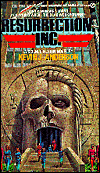 I borrowed Steven Casey's Set Phasers on Stun from Lucky Bob because it sounded interesting and Lucky wrote a good review. I did the borrowing back in... oh, December. Really. It's been on the sidebar a long time, huh?
I borrowed Steven Casey's Set Phasers on Stun from Lucky Bob because it sounded interesting and Lucky wrote a good review. I did the borrowing back in... oh, December. Really. It's been on the sidebar a long time, huh?Well, I made the mistake of setting the book by the bed as a little before-bed reading. Unfortunately, though it's interesting, it gave me kafka dreams if I read it right before bed. I mean, the whole book is about situations where there was a small error in engineering--generally, where a product was designed without the end-user in mind--and sadly most of these ended in tragedy, one life or many. Not the best bedside reading.
So I read almost all of it in the last couple weeks not at bedtime, and it was much better. It's a very interesting book, and I can see why it was a textbook for an engineering design class. Now I just have to figure out how to get it back to its rightful owner.

